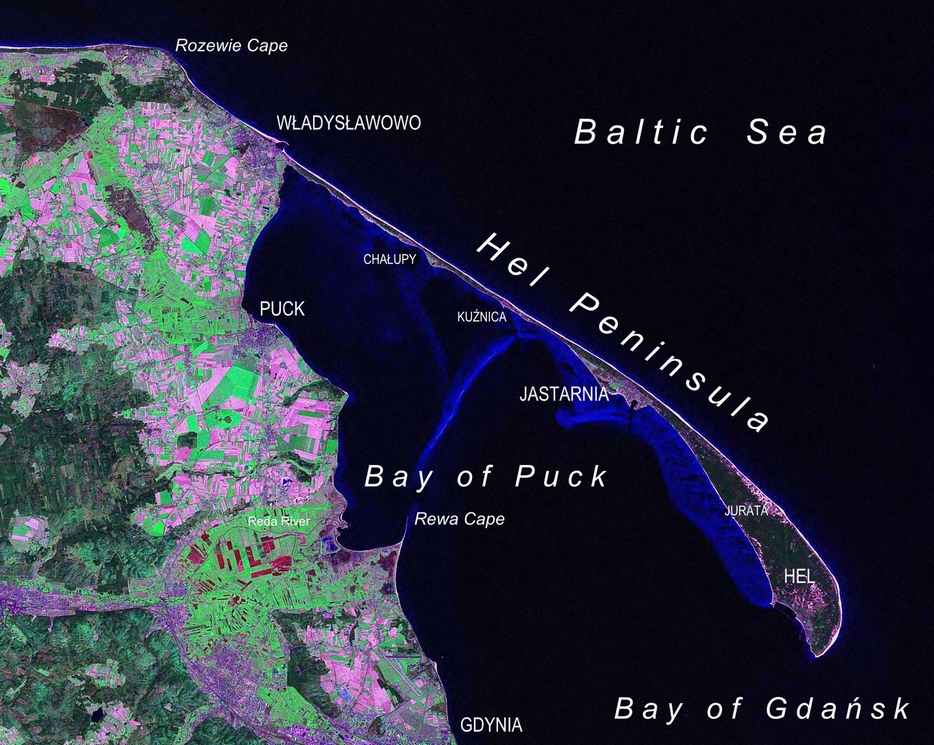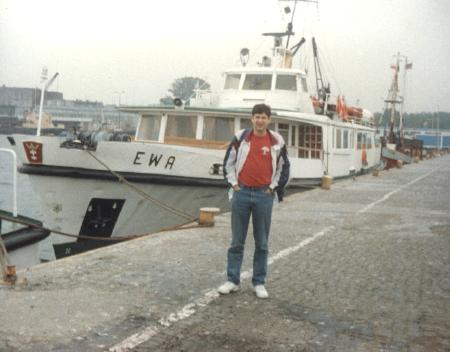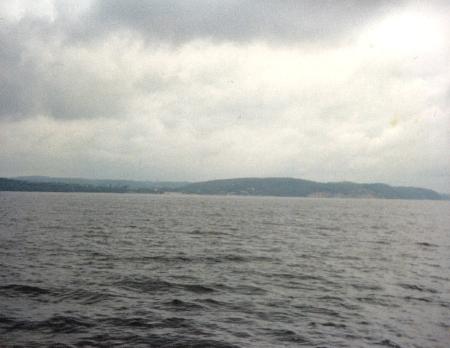Poland’s Hel Peninsula is an odd strip of sand jutting 35 kilometres into the Baltic Sea (map). It cradles the Bay of Puck along its inward side. At its widest point near the tip it reaches perhaps 3 kilometres. However, it slims down to a diminutive 300 metres or less across much of its length.
Historically storms tend to wash across the sandbar to turn it into an island. Then the residents build it back up to reform its peninsular shape. On a Polish map it goes by Mierzeja Helska which is hardly remarkable. One the other hand its anglicized name provides all kinds of wonderful opportunities for wordsmithing and bad jokes.
Welcome to Hel

I’d forgotten about Hel and I’m not sure why it came back suddenly from my subconscious. I hadn’t thought about it much at all the last fifteen years or so. You see, once you’ve been to Hel and back it’s done. And I accomplished that on a cold, rainy day in 1993.
Catching Hel

I traveled much more flexibly in those bygone days before marriage and well before kids. A trip to Europe involved little more than an airline ticket and a vague plan for securing space on a friend’s couch. In this instance the friend was living in Poland for a couple of years as a newly-minted MBA graduate, helping Polish companies adjust to a market-based economy.
Poland had broken the shackles of Communism only four years earlier. It was still several years away from joining NATO or becoming a member of the European Union. So it faced an odd and interesting transitional period that I didn’t fully understand or appreciate at the time.
All I cared about was the Zloty trading at 16,000 to the Dollar because of rampant inflation. Eventually the government redenominated the currency and lopped-off a bunch of the zeros, but whatever. I could travel quite comfortably throughout Poland for a couple of weeks even though I was still in the early part of my career and not earning a whole lot by Western standards.
Going to Hel
My American friend residing in Krakow. We traipsed about the country and eventually found our way up to Gdansk. That’s the city so famous in the late Twentieth Century for giving birth to the Solidarity movement that led to the eventual downfall of Communism in Poland. Yes, of course we toured the medieval city and viewed the Solidarity monument. We hit all the appropriate historical sites. However, we were there for another purpose entirely: we wanted to go to Hel.
My friend suggested the journey. A ferry runs from Gdansk to Hel during the summer and it would be an easy task to accomplish. I’m an aficionado of odd geography and I have a fascination with passenger ferries (what, you thought that was a new thing?). And you already know I have a warped sense of humor, so why not? Who’d want to pass up an opportunity to go to Hel?
Hel or High Water

The road, or in this case waterway, to Hel was paved with good intentions. We boarded the ferryboat determined to cross the River Styx Bay of Puck, on a heading towards the tip of the sandspit. A cold wind and intermittent drizzle bedeviled us as we sailed across the sound. So we confined ourselves to a protected cabin. No other passengers joined us on the journey.
A member of the crew approached us and of course I didn’t understand a word. Luckily my friend had become quite proficient in the Polish language and figured out that we’d be spending very little time in Hel. We’d have an hour-and-a-half. It was a slow day and the crew wanted to knock-off early, never mind the published schedule. Either we’d return at the appointed time or we’d experience a night in Hel. They wouldn’t be waiting for us.
Escape from Hel
Actually this turned out to be a blessing in disguise. Although reports of Hel seemed favorable as a summer resort, which seems to have been confirmed by all sorts of pages found on the modern Internet (including the wonderfully-named “Go HEL” website) it wasn’t such a pleasant destination that particular day. I’m sure it’s actually a lovely place. Unfortunately we were the only ones foolish enough to wander around a seaside destination on a raw, rainy day.
The suffix “Y” in the Polish language makes a noun plural. Getting hungry, we noticed a single dining option, a weatherworn establishment with a sign reading Hamburgery. Even I could translate that one. We ate alone, probably the only customers of the day at the hamburgery. We wondered if the sign might actually have been printed in English because we’d received a most unique interpretation of the burger, as in: “I’m not sure I’d call this a burger necessarily but it’s definitely hamburgery”. I think it may have been pork. I don’t know. It could have been anything.
We made it back to the ferry. In fact we arrived extra early just to make sure we’d get back to Gdansk that evening. On the ride back we both agreed that we’d expended an awful lot of effort just so we could say we’d been to Hel and back.
I’d do it again.

Leave a Reply